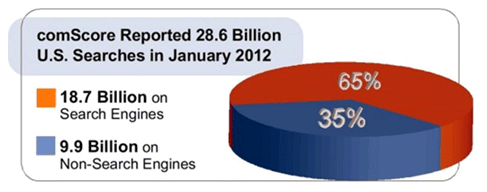How To Sell Your CEO On Investing More In Search. Hint: It’s About Insights
If you’re the CMO of any business, you’re likely aware of popular search strategies and how search can take consumers along the purchase journey from intent to action. According to Fleishman-Hillard and Harris Interactive’s 2012 Digital Influence Survey, 96% of consumers worldwide indicated that they searched for information about brands or products on the internet, […]
If you’re the CMO of any business, you’re likely aware of popular search strategies and how search can take consumers along the purchase journey from intent to action.
According to Fleishman-Hillard and Harris Interactive’s 2012 Digital Influence Survey, 96% of consumers worldwide indicated that they searched for information about brands or products on the internet, with 89% relying on search engines to help make purchase decisions.
comScore has also released data showing that there are billions of searches every month, with 65% happening on search engines.
Despite these statistics, convincing your C-Suite to invest heavily in search and other strategies fueled by data can be challenging, especially for those of you in long sales-cycle industries.
In a presentation at MediaPost’s recent Search Insider Summit, Chris Moloney, CMO of Wells Fargo Advisors, discussed the hurdles he’s had to overcome as the CMO of a finance-based company and the positive impact search data has had on his business. “There’s a real power to take search data and influence corporate strategy.” Guess what? He’s right.
Moloney even went on to give an example of how search data informed the company strategy for Scottrade, revealing that what people searched for online informed the change in their positioning from a “discount brokerage” to “online investment.”
The value of search today goes beyond a search ad, character limits and a data-driven display ad served on your PC. While these media strategies will continue to play a role in the consumer funnel and serve as effective marketing strategies, there’s more to the story.
The underlying role of search lies within the intent and insights gleaned from what your audience is searching for as they move across the web. In this new role, search becomes a key informant for a brand’s marketing strategy, influencing everything from your website content to audience buying, media strategy and product launches.
The challenge is that search is not “new.” It has been around for nearly 25 years, so convincing marketers to look at search in a different light, and even use it in other ways, is no easy task. There is a learning curve that marketers are experiencing as they consider search today and how it will evolve.
Make Search Data Part Of Your Acquisition Strategy

Understanding the initial point of interest (many times it starts in search engines) all the way through the conversion (could end on your website, refined product search within the search engine, or even offline) is important because it helps to guide your customer strategy.
To drive new prospects, you should know the optimal time to reach them, and search data can help you determine that.
Secondly, finding these potential new customers is also a challenge. With search, it is easy to identify what a customer is interested in, and if you are using search retargeting, you should be able to find that user and reach them with relevant ad messages.
A typical consumer begins their search on a search engine, but then they move on to vertical, ecommerce and shopping comparison sites (often through organic search results). They might even take a break from their search and read and browse the web.
When you leverage search data to power your digital advertising, you have a greater chance to influence new customers before they make a decision. The ability to know what people are searching for as they cruise around the web is extremely powerful and can help to create a more complete picture of your audience, signaling when to reach them.
Search Data Is Your Best Consumer Research
There isn’t an industry that doesn’t benefit from the way in which consumers conduct research online. With all of the search engines they visit, and subsequent sites that contain search boxes, the number is in the billions of searches every month. As a result, there is a significant amount of intent-driven data flowing through our digital channels that should be used for customer research.
This data reveals how important various factors are in the decision-making process – e.g., did they search for pricing comparisons, customer reviews, or directly search for your competitors? All of these audience insights are available through searches conducted online (not just in the search engine). The best way to understand your customer is to look under the hood at search trends across your customer base.
Hint: The most powerful search data may actually live beyond core search engines.
Let Data Inform Your Brand

With search, it’s about the data and how it can be garnered for audience insights, seasonal consumer trends and targeted messages that extend to your website content, display ad creative and product strategies.
As an industry, we’re extremely lucky to have this wealth of knowledge at our fingertips. Using the power of search is essential in staying ahead of your competitive set and ensuring that you have a strong relationship between your brand and both current and potential customers.
Stock images used with permission of Shutterstock.com
Opinions expressed in this article are those of the guest author and not necessarily MarTech. Staff authors are listed here.
Related stories
